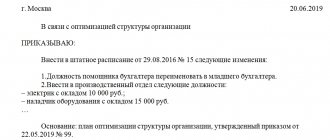For what reasons do job descriptions most often change?
This document is usually generated immediately after the registration of the enterprise for each position of the staffing table for an indefinite period. In the future, as practice shows, most often the job description undergoes changes for the following reasons: changes in the structure of the organization (reduction or increase in divisions and departments), reduction of personnel, redistribution of labor functions in order to optimize the work of employees. Also, adjustments to job descriptions may be required when amendments are made to legislation.
What to do if an employee does not agree with the changes
Often the corrections are not to the employee’s liking. If he refused to sign the addendum to the DI, he should proceed as follows.
In the presence of several witnesses, draw up an act of refusal to sign the document. First, read the document out loud and draw up an act of refusal to read it (if you haven’t read it) or refusal to sign (if you read it but didn’t leave an autograph under the new edition of the instructions). The act indicates positions and surnames.
If a situation arises in which the work function cannot be left the same, you will have to negotiate with the employee about different options. Transfer him to another position (Article 72.2 of the Labor Code of the Russian Federation) or dismiss him by agreement of the parties (Article 78). If the employee does not want to work in a new way and it is not possible to transfer him to another job, then the employer has the right to terminate the employment contract with him (clauses 3, 4, article 74, clause 7, part 1, article 77 of the Labor Code of the Russian Federation).
What is the order for?
You cannot simply change some lines in the job description of an employee of an enterprise. This is a rather serious procedure, which includes several stages, and the very first is the issuance of an order to make changes.
An order is an administrative act on the basis of which other company employees implement management instructions.
The absence of an order in the event of inspections of the organization’s activities by state supervisory authorities may lead to administrative punishment of the director and the legal entity itself.
Notification of changes to the terms of the employment contract determined by the parties
In accordance with Art. 56, 57 of the Labor Code of the Russian Federation, the subject of the employment contract includes:
- description of the employee’s job function;
- working conditions.
Since the content of the DI is not regulated, it may include information related to the employment contract in the above part. Changing its conditions is carried out in 2 ways:
- By agreement of the parties - as a general rule (Article 72 of the Labor Code of the Russian Federation). Therefore, it is advisable to formalize a change in the DI, which is part of the employment contract, in an additional agreement to it.
- At the initiative of the employer - in case of organizational and technological changes (Article 72 of the Labor Code of the Russian Federation) while maintaining the same labor function. In such a situation, you need to notify the employee 2 months in advance of the upcoming changes (a sample notification and some details of the changes can be found at the link: Notification of changes in the terms of the employment contract). If the terms of the employment contract do not change (for example, qualification requirements are adjusted), this requirement does not need to be observed.
Please note that the procedure for developing a new DI or its changes, agreeing and issuing an order to approve changes, the contents of this order do not have to be brought to the attention of the employee, since these procedures and documents do not affect his labor rights and do not relate to the information provided on the basis of clause 1 Art. 62 Labor Code of the Russian Federation.
The corresponding conclusion was made in the decision of the Zheleznogorsk City Court of the Krasnoyarsk Territory dated 02/01/2011 in case No. 2-215/2011. The subject of information and agreement, if necessary, is only the content of changes in the DI.
Whose autographs should appear on the document?
Since all orders are issued on behalf of the director, he must be the first to sign this order.
In addition to him, the form must indicate all the persons to whom he is related, as well as those employees of the enterprise who are responsible for the execution of the order. It should be said that in some cases, employees of an organization can leave their autographs about familiarization not directly in the order itself, but in a separate act or statement (this is especially true in large companies with a large number of personnel).
A stamp in a document is not a strictly mandatory condition for its authenticity, but if there is an indication of its use in the company’s regulations, then the order should still be endorsed using a stamp.
What changes to the job description change the job function?
The description of the labor function in the contract with the employer must comply with Art. 15 Labor Code of the Russian Federation:
- indication of position (profession, specialty) and qualifications;
- type of work to be performed.
It should be taken into account that the absence of mention of a position in the staffing table does not prevent the relationship from being recognized as an employment relationship (Definition of the Constitutional Court of the Russian Federation dated May 19, 2009 No. 597-О-О).
It is possible to establish a different or significantly changed job function only by agreement with the employee, since in fact this is his transfer to another job (Article 72, 72.1 of the Labor Code of the Russian Federation). Without his consent, it can be changed only for a certain period and in the cases specified in the Labor Code of the Russian Federation (Parts 2, 3, Article 72.2 of the Labor Code of the Russian Federation).
From the above legal provisions it follows that adjusting job responsibilities within the framework of work for a certain position does not change the labor function (see, for example, the determination of the Moscow City Court dated 09/07/2015 No. 4g-9509/15). It can only be changed by new responsibilities that actually lead to work in a different position.
So, a change in a job description is formalized in various ways: approval of a new edition (with or without the issuance of an order), issuance of an order to make changes, or an additional agreement to the employment contract. At the same time, a change in the labor function, if any, is agreed upon with the employee, or adjustments to the terms of the employment contract caused by organizational needs are brought to his attention 2 months in advance.
The employee can be made aware of any other amendments at any time.
Expert opinion
Mikhailov Vladislav Ivanovich
Lawyer with 6 years of experience. Specializes in family law. Knows everything about the law.
According to Art. 72 of the Labor Code of the Russian Federation, changing the terms of an employment contract, including transfer to another job, is allowed only by agreement of the parties to the employment contract, except for cases provided for by the code itself.
Meanwhile, in accordance with Art. 74 of the Labor Code of the Russian Federation in the case when, for reasons related to changes in organizational or technological working conditions (changes in equipment and production technology, structural reorganization of production, other reasons), the terms of the employment contract determined by the parties cannot be preserved, they are allowed to change on the initiative employer, with the exception of changes in the employee’s job function.
The employer is obliged to notify the employee in writing of the upcoming changes to the terms of the employment contract determined by the parties, as well as the reasons that necessitated the need for such changes, no later than two months in advance.
Good afternoon. You can change the job description, which is a local regulatory act, by issuing an order approving a new edition of the instructions, or approving changes to the instructions.
If the changes ultimately affect the responsibilities of existing employees, they should be notified of this at least 2 months in advance and consent must be obtained (Article 74 of the Labor Code of the Russian Federation).
Hello. In accordance with Art.
72 of the Labor Code of the Russian Federation, changes in the terms of an employment contract determined by the parties are allowed only by agreement of the parties to the employment contract, with the exception of cases provided for by the Code. An agreement to change the terms of an employment contract determined by the parties is concluded in writing.
Thus, if you do not enter into an agreement to change them in relation to previously concluded employment contracts, they will continue to operate on the same terms, that is, with job descriptions as an integral part of the contract. On the other hand, the introduction of new job descriptions (as a local act of the organization) will also require mandatory familiarization of employees with them.
In addition, we draw your attention to the fact that it is advisable to include a link to the job description in the text of the employment contract.
In accordance with Art. 60.2 of the Labor Code of the Russian Federation, an employee may be assigned to perform, during the established duration of the working day (shift), along with the work specified in the employment contract, additional work in a different or the same profession (position) for additional pay and with the written consent of the employee.
Transfer to another job - a permanent or temporary change in the labor function of an employee and (or) the structural unit in which the employee works is permitted only with the written consent of the employee, with some exceptions (Article 72.1 of the Labor Code of the Russian Federation).
The employee’s consent is not required to move him from the same employer to another workplace, to another structural unit located in the same area, or to assign him work on another mechanism or unit, unless this entails a change in the terms of the employment contract determined by the parties. It is also allowed to temporarily transfer an employee without his consent for a period of up to one month to a job not stipulated by an employment contract with the same employer in cases of downtime (temporary suspension of work for reasons of an economic, technological, technical or organizational nature), the need to prevent destruction or damage to property or replacing a temporarily absent employee, if downtime or the need to prevent destruction or damage to property or replacing a temporarily absent employee is caused by emergency circumstances.
In this case, transfer to a job requiring lower qualifications is permitted only with the written consent of the employee. The procedure for paying bonuses is determined, as a rule, by an internal local act of the enterprise or a collective labor agreement.
In accordance with Art. 74 of the Labor Code of the Russian Federation, in connection with changes in organizational or technological conditions, it is allowed to change some working conditions at the initiative of the employer, with the exception of changes in the employee’s labor function.
The employer is required to notify the employee of changes two months in advance. If the employee does not agree to work under the new conditions, the employer is obliged to offer another available job.
If there is no work or the employee refuses the offered work, the employment contract is terminated in accordance with clause 7 of Part 1.
1 tbsp. 77 Labor Code of the Russian Federation.
NOTE:
We will only talk about cases where the job description is approved as a local act. If it is formalized as part of an employment contract, then in the event of a change in duties, it is necessary to obtain the employee’s consent. When can job responsibilities be changed without the employee’s consent?
You can reduce or increase the scope of responsibilities, as well as specify them. The employee's consent is not required for this.
But it is important that the labor function remains the same.
There is no single approach to the question of what is considered a labor function. Most often, courts recognize that this is not only the title of the position, but also its content, that is, the nature of the duties.
Expert opinion
Mikhailov Vladislav Ivanovich
Lawyer with 6 years of experience. Specializes in family law. Knows everything about the law.
A job function can only be changed through a transfer, which always requires the employee’s consent (part one of Art.
15, para. 3 hours
second st. 57, part.
first st. 72.1 of the Labor Code of the Russian Federation).
For example, it is impossible to approve a new job description according to which an employee who performed the functions of a marketer will be involved in accounting.
The court decides in each specific case whether the adjustment of duties in the job description entails a change in the job function. As a result, he finds out whether it is necessary to obtain the employee’s consent to such a change (decision of the Constitutional Court of the Russian Federation dated September 25, 2014 No. 1853-O).
Increased responsibilities
The employer has the right to increase the scope of responsibilities for the position held by the employee. This will not be a change in the labor function (decision of the Moscow City Court dated July 2, 2013 No. 4g/1-5084).
Reduced responsibilities
Clarification of responsibilities
How to make changes to a job description
Often the employee is not satisfied with the changes, and he refuses to sign the new version of the job description. In this case, read the document out loud and draw up a statement in any form stating that the employee refused to read the instructions.
Draw up the act in the presence of two or three witnesses. Further actions will depend on whether the scope of work changes or responsibilities are clarified.
The employee's workload has changed
It is necessary to prepare evidence in case of a legal dispute.
You will have to prove that:
– organizational or technological working conditions have changed;
– the previous terms of the employment contract cannot be preserved;
– there was no change in work function.
The law does not clearly define what organizational or technological changes are.
There is an approximate list (Article 74 of the Labor Code of the Russian Federation, paragraph 21 of the Resolution of the Plenum of the Supreme Court of the Russian Federation dated March 17, 2004 No. 2).
In itself, reducing or increasing the amount of work performed will not be such a change.
Main organizational and technological changes under which working conditions can be changed
Organizational changes
– change in organizational structure;
– new work and rest regimes have been introduced;
– labor standards have been revised;
– loads have been redistributed between departments and employees;
– refusal of certain types of activities.
Technological changes
– new machinery and equipment were introduced;
– transition to new production technology;
– improvement of working conditions based on the results of a special assessment;
– production of new types of products has begun.
The organization must notify the employee in writing about upcoming changes to the terms of the employment contract and their reasons no later than two months in advance and offer a transfer to suitable vacancies.
If the employee agrees with the changes, then an additional agreement to the employment contract is concluded with him (Article 72 of the Labor Code of the Russian Federation).
If the employee refuses to work under the new conditions and cannot be transferred to another position, the employer has the right to terminate the employment contract with him after two months (Article 74, paragraph 7 of Part 1 of Article 77 of the Labor Code of the Russian Federation).
If an employee is fired for refusing to work under new conditions, then he is paid severance pay in the amount of two weeks’ average earnings (part three of Article 178 of the Labor Code of the Russian Federation).
Clarification of employee responsibilities
If an employee performs the duties of a temporarily absent colleague without being released from his main job, he is entitled to additional payment. Its size is established by agreement of the parties, taking into account the content of additional work (parts one and two of Article 151 of the Labor Code of the Russian Federation).
If the second position is chosen, it is necessary to prepare evidence that the deputy’s salary takes into account the increased amount of work during the replacement of the manager.
Normative base
1. Part one of Art. 15, para. 3 hours second art. 57, part one, art. 72.1 of the Labor Code of the Russian Federation will help you understand that the labor function is the title of the position and the nature of the employee’s duties
3. Articles 72, 74, paragraph 7 of the first article. 77 of the Labor Code of the Russian Federation will help you figure out how to act if the adjustment of duties entails a change in the terms of the employment contract.
IMPORTANT TAKEAWAYS:
1. It is possible to change the responsibilities in the job description without the consent of the employee if it is drawn up as a local act. However, this should not lead to a change in work function.
Expert opinion
Mikhailov Vladislav Ivanovich
Lawyer with 6 years of experience. Specializes in family law. Knows everything about the law.
2. If, as a result of a change in duties, the terms of the employment contract change, the notification procedure provided for in Article 74 of the Labor Code is applied.
3. If the duties in the new edition of the instructions are only specified, then there is no need to warn the employee about this two months in advance. Penalties may be applied for refusal to follow instructions.
According to current legislation, an employment contract with an employee is terminated due to the latter’s refusal to continue work due to a changed job description. Dismissal due to refusal to continue working under new conditions is regulated by Chapter 12 of the Labor Code of the Russian Federation as amended.
Let's consider how to correctly dismiss an employee who does not agree with the changes, as well as the procedure for the employer if the employee wants to quit earlier.
How to account and store
The order, as one of the main documents regulating the activities of the organization, is subject to certain accounting. To do this, information about it must be entered in a special accounting journal, where it is enough to make a note about the date of its issue and number. After this, the completed form and signed by all interested parties should be filed in the same place where other similar papers are already stored. Here it must be available for the period established by law or for the period prescribed in the accounting policy of the enterprise.
Procedure for dismissal due to a change in job description
A change in job description at the initiative of the employer must be accompanied by certain actions in the process of documenting the changes.
Step 1. Make a decision
A change in job responsibilities at the initiative of the employer begins with the employer making such a decision. Article 74 of the Labor Code of the Russian Federation provides for the need to inform the employee about future adjustments to the terms of the contract and the reasons that caused them in writing at least two months in advance. To do this, the manager sends a notice to the employee.
Step 2. Notify the employee
The employer issues a notice warning the employee that there will be an adjustment to the previously established working conditions, including an adjustment to the job description. Changing an employee’s job functions at the initiative of the employer unilaterally is prohibited.
The notice shall indicate the reasons and grounds for the changes. The document must be drawn up in two copies and registered.
The notice may be given in person or sent by registered mail. When handing it over personally, the employee puts a mark on the copy belonging to the manager indicating that he has read and received the copy, along with his signature and date.
The employee can record his agreement with the new terms of the job description proposed by the employer on a notice on the manager’s document.
If the employee refuses to sign, the employer draws up a local report stating that the notice of updating the job description was presented to the employee and read out loud, but he refused to sign it. This form of notification to the employee is considered appropriate.
Step 3. Obtain consent or refusal
Expert opinion
Mikhailov Vladislav Ivanovich
Lawyer with 6 years of experience. Specializes in family law. Knows everything about the law.
Refusal to work according to a new job description can be indicated either directly on the notice or in a separate statement that must be registered.
If the employee does not object to changing the terms of duty and responsibility, the following is done:
- changing the job function (at the initiative of the employer), familiarizing the employee with it;
- publication and signing of an additional agreement (annex to the employment contract), which includes information about the updated conditions (this may be the place of work, the amount of wages, the term and beginning of the contract, the nature of the work).
Since changing job responsibilities without the employee’s consent is not allowed, the employer’s procedure in the absence of the employee’s consent to continue working in a new way will be different.
Step 4. Notify employment authorities
Due to adjustments to the job description in the organization or labor technology, there may be a threat of mass layoffs, and then the employer has the right to introduce a part-time working regime. It is determined by h.
5 tbsp. 74 Labor Code of the Russian Federation.
An industry agreement will help determine whether a potential layoff is massive; in its absence, the Regulations on the organization of work to promote employment in conditions of mass layoffs (approved by Resolution of the Council of Ministers of the Russian Federation dated 02/05/1993 No. 99).
The maximum period for introducing the regime is six months.
The employer is obliged to notify the employment service about the fact of introducing the regime no later than three working days after the decision to carry out the activities is made.
If the reduction concerns at least one staff position, the manager warns the employment service two months before the event. In case of mass layoffs, three months' notice is required.
Step 5. Offer vacancies
Since changing the job description without the employee’s consent is unacceptable, in the absence of consent to work in a new way, the employer must offer another available job in writing (this may be a position corresponding to the employee’s qualifications, a vacant lower-level position, or a lower-paid job that the person can perform, taking into account the state of health). In this case, the employer must offer all vacancies that meet these requirements in this area.
Vacancies in other territories must be offered if this is provided for by the terms of a collective or employment contract or agreement.
The job offer is drawn up in a separate document in the form of a list of vacant positions, for which working conditions are indicated (payment, working hours, etc.).
Step 6. If the vacancies are not suitable, we formalize the dismissal
If there are no vacancies or the employee’s written refusal of the proposed job is received, the employment contract must be terminated in accordance with clause 7, part 1, art. 77 of the Labor Code of the Russian Federation (Part 4 of Article 74 of the Labor Code of the Russian Federation).
The employer issues an order in form T-8 or T-8a, which is established by Resolution of the State Statistics Committee of Russia dated January 5, 2004 No. 1.
The order states:
- Business name;
- location;
- number, date;
- FULL NAME. and the position of the employee;
- date and reason for dismissal.
The date of dismissal is the employee's last day of work. It is necessary to pay attention to the fact that when issuing an order, it makes reference to clause 7 of part 1 of Article 77 of the Labor Code of the Russian Federation.
The order is signed by the manager. The employee indicated in the document gets acquainted with it under his signature indicating the date.
If the employer does not have the opportunity to familiarize the subordinate with the order in writing or he does not want to familiarize himself with it under signature, an appropriate note must be made in the document.
It is necessary to make an entry in the work book regarding the termination of the employment contract due to the employee’s refusal to continue working due to the changed terms of the employment contract (job description).
In the case under consideration, a record of the basis and reason for dismissal is given in accordance with the wording provided for in paragraph 7 of part 1 of Art. 77 of the Labor Code of the Russian Federation, with reference to this norm.
The basis for making an entry in the work book is an order. Entries are made according to the following rules:
- Column 1 indicates the serial number of the entry being made;
- in column 2 - the date of the entry made;
- in column 3 - the reasons and grounds for the dismissal of the employee in wording that exactly repeats the wording of the order;
- in column 4 - details of the order (instruction) on dismissal.
The entry in the work record for the period of activity with the employer is certified by his signature or the signature of the person responsible for maintaining work records, a seal (if any), as well as the signature of the employee himself.
Sample order to amend a job description
If you need to make an order to make changes to a job description that you have not encountered before, study its sample and detailed analysis - with its help you will create the correct order without any problems.
- To begin, enter the name of the company into the document, then assign a number to the order, indicate the place and date of its creation.
- Next, form the main part. Here it is necessary to indicate the basis for drawing up the order (i.e., provide a link to the law or internal act of the company that is directly related to the document being created), as well as the justification (i.e., the real reason).
- Then enter the name of the position for which the functions are changing, and in order, enter in the order an indication of those items of the job description that are subject to amendment.
- Include a new version of each item, then mark the employee who will be responsible for the execution of this order.
- At the end, do not forget to take care of collecting signatures for the document.
The procedure for making changes if the job function does not change
The first stage is the preparation of specific amendments to the job description. There are no strict design rules; the essence of innovation is important here. If this is an independent document, then the procedure is not complicated. If the provisions are slightly edited (specification of the labor function), the employee’s consent is not required. An addition to the DI is being drawn up. The employer approves the document by order, and the employee signs it.
sample additional agreement to job description
Some changes to the duties of employees are made without their consent if:
- actions and wording are clarified without changing the meaning and number of responsibilities;
- the content is being specified due to the introduction of new regulations and professional standards;
- The job title is adjusted without radically changing the meaning.
The employer has the right to correct some conditions of the job description on his own initiative, for example, when updating organizational or technological working conditions. Provided that the labor function remains the same (Part 1, Article 74).
IMPORTANT!
The law requires sending the employee a written notice of changes and reasons two months before implementing these plans (Part 2 of Article 74 of the Labor Code of the Russian Federation).
If there are a large number of amendments, it is advisable to adopt a new edition of the DI. It is formed in two copies: one for the employer, the second for the employee.
If the DI is an annex to the employment contract, the procedure is more complicated. Changes are not introduced only by order of the manager. Here, even minor amendments cannot be made without the consent of the employee. This is fixed by concluding an additional agreement. The order is as follows:
- First, an additional agreement is drawn up, which lists all the innovations.
- The employer and subordinate then sign it. One copy is given to the employee, the second is left in the HR department in case of labor disputes.
General provisions on job descriptions
A job description is a local act that defines a list of responsibilities of employees working in certain positions (loader, chief engineer, HR specialist, etc.).
All employees to whom the instructions apply are required to comply with them if this is stipulated in their employment contracts. When concluding an employment contract, the employer is obliged to familiarize the hired employee with the local regulations in force in the organization, including the relevant job description.
However, the employee’s responsibilities can also be specified in the employment contract - in this case, a separate job description is not required. If the rights and responsibilities of an employee are not reflected in detail in the employment contract, it contains a link to the job description in which they are spelled out.
In the absence of clearly regulated job responsibilities, work in an organization cannot be effective, since the worker will not know what exactly he must do. In addition, in this case the employer will not have the opportunity to impose a penalty on the negligent employee for unfulfilled work.
Refusal of the employee to read the instructions
In such situations, the employer draws up an act in which witnesses (at least two) from among the company’s employees sign.
Often in practice, the manager sends a new version of the instructions to the employee by mail. The shipment is issued in the form of a registered letter with an inventory and notification. In this case, the employee will be considered to have read the new version of the instructions.
It must be said that the fact of an employee’s refusal cannot be regarded as a disciplinary offense. The employer will have grounds for liability if the employee subsequently evades the performance of his duties in accordance with the adopted document. The employee’s disagreement with any points of the instruction is not considered grounds for its cancellation.
Nuances
Despite the fact that it is quite simple to document a job description, in practice its adjustment raises many questions.
After all, the employee may not agree with the increase in the scope of work or other new conditions of the agreed document.
Is it possible without the employee’s consent and additional payment?
Of course, within the framework of the law, any change to the company’s local regulations that require a worker’s signature is impossible without his participation.
Accordingly, if the employee does not agree, the only solution to the problem is negotiations, not dismissal.
After all, it is possible to terminate an employment relationship only if changes are made to the employment contract at the initiative of management unilaterally, and even then in the presence of compelling reasons specified in Article 74 of the Labor Code of the Russian Federation.
And since the DI, even as an appendix, is not the main document, the directorate does not have the right to apply Part 7 of Article 77 of the Labor Code of the Russian Federation.
That is, if an employee refuses to sign a new edition of the job description, the employer must convince him of the advisability of such a decision, for example, by referring to bringing the specified document into compliance with the requirements of the ETKS.
If agreement is not reached, legal relations can continue only in the mode of the previous instructions, without any sanctions from management.
How is it processed for municipal employees?
Article 5 of the Federal Law dated March 2, 2007 N 25 states that municipal employees are subject to almost all the requirements that apply to civil servants, in particular, to qualification requirements and skills.
At the same time, Article 47 of the Federal Law dated July 27, 2004 N 79 states that it is employees of government agencies who perform their duties on the basis of job regulations approved by the employer’s representative in full compliance with the law.
That is, if at any stage of cooperation it is necessary to make changes to the specified document, not only the employee’s consent will be required, but also his notice two months in advance, and even then if the essential terms of the contract are changed without adjusting the main terms of reference.
If it changes dramatically
One of the main conditions of the agreement on mutual cooperation is the labor function, which can be changed only in exceptional cases and in compliance with the norms of Article 72 of the Labor Code of the Russian Federation.
And since it is the range of responsibilities enshrined in the job description that is the main function, at the first stage it will be necessary to warn the employee two months in advance by notification and issue an additional agreement to the main contract together with the order.
But in this situation, it is advisable to develop the DI again, in a new edition.
How to correctly issue an order for approval of a job description? How to number additional agreements to an employment contract? Find out here.
Instructions for filling out sick leave by your employer are here.
How to deposit for all employees at once?
As a rule, job descriptions are developed not for a specific person, but for a position, the name of which is contained on the title page.
If an enterprise changes the name of vacancies, for example, bringing them into line with professional standards, there is a need to update all instructions at the same time. In such a situation, each instruction is already written as laws, but the order approving the changes is already issued alone.
Ways to make changes
The main ways to make changes to the instructions are as follows:
- Concluding an additional agreement to an employment contract - applies in cases where instructions to it were drawn up as an appendix;
- Draw up and approve new instructions - used in cases where the instructions are presented as a separate document.
Thus, the method of making changes to the instructions will depend on how exactly such a document was drawn up - as a separate document, or as an annex to the employment contract. Which method for drawing up instructions will be chosen by the employer depends on his desire.
If commercial firms decide to include job descriptions in their document flow, they must adhere to the procedure established for their execution and approval.
The main condition is that the employee is familiar with the contents of such a document. To confirm his familiarization, the employee must sign: either on the instructions, or on the familiarization form, or in a special journal. For companies with a small number of employees, the most suitable way of familiarization is by signing the instructions themselves.
Arbitrage practice
It is not necessary to apply the norm of Art. 74 of the Labor Code of the Russian Federation with a complete change of duties. This is risky even without renaming the position. Thus, the Primorsky Regional Court declared the new job description illegal after comparing its two versions (old and new), seeing this as a change in the employee’s labor function. Moreover, the employer’s arguments about drawing up the job description as a separate document, and not as an appendix to the employment contract, did not influence the court’s conclusion (ruling dated March 26, 2014 in case No. 33–2307). In such a situation, you need to negotiate with the employee about transferring to another job.
In addition, it may be unnecessary to carry out Art. 74 of the Labor Code of the Russian Federation clarification and adjustment of the wording of the job description. For example, including in the instructions a list of software that an employee usually uses, or detailing daily operations and procedures. The courts also indicate that specifying job responsibilities does not lead to a change in the labor function, that is, position and type of activity (appeal ruling of the Astrakhan Regional Court dated July 2, 2014 in case No. 33-1947/2014).
In what cases is an order needed?
Typically, the form of the order is approved at the very beginning of the activities of the organization or institution. But sometimes such an order has to be formed already in the process of carrying out the activity. This is necessary in case:
- creation of new staff units in the structure of an institution or organization;
- changes in legislative acts regulating the labor function of employees;
- changes in technological approaches and requirements.
Also, an order to introduce new job duties or adjust old ones may come from higher organizations or ministries. Businesses may change the functions associated with a particular position at will at any time. The main thing is that appropriate changes are made to employees’ employment contracts.







